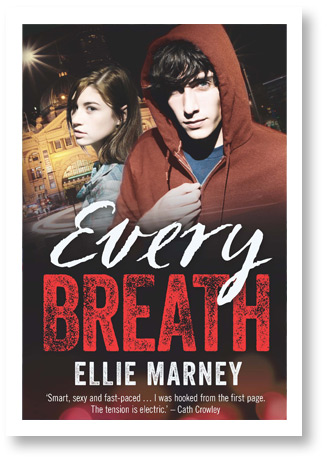Guest post written by Ellie Marney

There’s no magic formula
There seems to be this trope in the writing community about process, where writers are often asked if they are ‘plotters’ (people who plot out the stories in advance, sometimes with detailed scene setups) or ‘pantsers’ (‘seat-of-the-pants’ writing, when the writer just starts writing with no organised plan in mind).
There’s widespread assumptions that being a ‘plotter’ is a more structured way of story-telling that creates efficient, well-thought-out narrative. ‘Pantsing’ is apparently a kind of organic/gestalt approach that produces deeper, more textured work. I’m often questioned about which type I am, and whether being a pantser affects my work and output.
Yes, I am a pantser. I usually sit down in front of the keyboard with nothing but the vaguest idea of what crazy stuff my characters are going to do next. Sometimes I’ll type up reams of dialogue or description or exposition that never make it into the final version of the book – this is a common result of seat-of-the-pants writing, that you edit firmly later.
Before that, though, you often produce pages of meandering rubbish, stuff that doesn’t fit. Not to say that this material isn’t useful: it can be extremely useful, in terms of giving you an insight into the story itself, or a little window into the character’s heads. I’ll admit it’s a bit agonising sometimes, though, to realise that all that stuff you wrote last week has now been reduced to a two-sentence aside, the equivalent of a fiction footnote.
But I’ve gotta say, I’m not a strict pantser, either. I jot down notes about where I think the story is going, or how events might link up. Sometimes I make a diagram of the story arc, so I know I’m on track. Usually I have an end point in mind – a finale showdown, or a dramatically tense moment – that I’m writing towards, even if the details of that point are still shady. I often complete detailed character questionnaires for the leads in my stories, and research as thoroughly as I can. And I always do my level best to stay on deadline, which is a professional courtesy – I can’t keep my editor waiting with the excuse that my ‘muse’ hasn’t yet struck – even if it sometimes requires some last-minute, burn-the-midnight-oil, frantic work.
One other admission: I don’t always avoid planning and structure.
Something I always feel like telling people when they ask about writing process is this – it’s never set in stone.
When I spoke to another YA writer friend, Lili Wilkinson, she said that she often jumps from one working style to another. It all depends on the project. I was struggling with a project at the time that seemed like a formless tangle of snakes, and I found that idea really refreshing, and liberating.
Some books lend themselves well to a looser, jazz-hands approach. Some require a tight leash. I don’t think you can write to a magical set formula, and you shouldn’t restrict yourself to a single style, especially if it blocks you or strangles your story. Don’t force it – if your typical writing process isn’t working, try something different. Let the story you’re writing be your best guide, and trust your instincts.
If you’re getting lots of random snippets of scenes and dialogue, great! Go write them down and order them later as you see fit. If you feel like the story is getting away from you, and you need to sit down and draw up a detailed plan of what’s happening, then you go do that. Reading other people’s work can sometimes be a good inspiration too.
Most importantly, go write! Don’t stop. Trust that the story will come in its own time, in its own way. Don’t give up. You’ll get that sucker finished eventually.
And have a good week.
Xx Ellie Marney
@elliemarney
Facebook: https://www.facebook.com/ellie.marney
Website: http://www.elliemarney.com/
Blog: http://elliemarney.blogspot.com.au/
– – – – – – –
I first met Ellie at a Ballarat writers event and as much as I enjoyed meeting her and hearing more about her craft that night when I really got inspired by her was at my local library. By chance I found out she was talking to a group of high school students (her target demographic). I loved how she connected with them, I felt so privileged to witness the interaction with her readers and have felt inspired by that moment ever since.